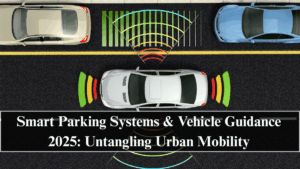In 2025, cities are embracing a new frontier in transportation — smart parking systems. As urban populations grow and vehicle ownership continues to rise, finding parking has become one of the most frustrating daily challenges. The solution lies in AI-driven, sensor-powered parking systems that guide drivers directly to available spots, reducing congestion, emissions, and wasted time.
Smart Parking Systems & Vehicle Guidance 2025 represent a transformative step toward efficient, automated city mobility. By combining artificial intelligence, real-time data analytics, and vehicle connectivity, these systems are making parking as seamless as navigation itself.

The Urban Parking Problem
Urban centers worldwide have reached critical density, with vehicles spending an average of 15 to 30 minutes circling for parking. This not only wastes time and fuel but also contributes to over 30% of city traffic congestion.
Traditional parking infrastructures can’t keep up with growing demand. That’s why smart systems powered by IoT (Internet of Things) sensors, AI algorithms, and cloud platforms are stepping in — offering real-time visibility and automated parking guidance for both drivers and city planners.
How Smart Parking Systems Work
Modern smart parking solutions use a combination of sensors, cameras, and data analytics to detect, monitor, and communicate parking availability instantly.
The system typically operates in three stages:
-
Detection: Sensors (ultrasonic, infrared, or magnetic) identify available spaces in real time.
-
Communication: Data is sent to cloud servers and integrated with vehicle navigation systems or mobile apps.
-
Guidance: Drivers receive on-screen or voice instructions directing them to the nearest available spot.
In advanced implementations, AI algorithms analyze historical parking patterns to predict availability and even reserve parking spots automatically.
Vehicle Guidance and Automation
Vehicle guidance systems are an integral part of this transformation. Many 2025 vehicles are equipped with automated parking capabilities that allow them to self-navigate into parking spaces without driver input.
Key technologies enabling vehicle guidance include:
-
Ultrasonic and radar sensors for spatial awareness
-
AI vision systems for object detection and precision control
-
Autonomous valet parking (AVP) integrated with smart parking lots
-
V2X communication for coordination between vehicles and infrastructure
In many smart cities, entire parking facilities are now managed autonomously — vehicles enter, park, and exit while the driver monitors progress remotely through an app.
Benefits of Smart Parking & Guidance Systems
The introduction of AI-powered parking infrastructure is delivering measurable benefits for cities, drivers, and the environment:
-
Reduced Congestion: Real-time guidance reduces unnecessary driving and idling.
-
Lower Emissions: Less fuel consumption contributes to cleaner air.
-
Improved Efficiency: Smart allocation of parking spaces optimizes city infrastructure.
-
Time Savings: Drivers reach destinations faster with minimal hassle.
-
Revenue Optimization: Dynamic pricing and automated billing streamline city revenue collection.
For electric vehicles (EVs), smart parking lots also integrate charging stations that automatically authenticate and start charging upon arrival — merging convenience with sustainability.
Leading Cities and Innovations in 2025
By 2025, many global cities are already deploying fully integrated smart parking ecosystems.
-
Singapore has rolled out AI-managed underground parking with automatic fee collection.
-
Dubai’s Smart Mobility Initiative includes self-parking EV fleets integrated with real-time traffic systems.
-
San Francisco has connected over 20,000 parking sensors to its citywide navigation grid.
-
Tokyo uses robotic parking systems that vertically stack vehicles, optimizing urban space.
-
Munich has implemented predictive parking powered by AI and historical traffic data.
Automakers like BMW, Tesla, Hyundai, and Mercedes-Benz are partnering with urban planners to make vehicle-to-parking (V2P) systems standard in upcoming models.
Challenges and Future Outlook
Despite remarkable progress, scaling smart parking globally poses challenges. Upfront costs for sensor deployment, system integration, and data standardization remain significant. Additionally, cybersecurity and privacy concerns arise as millions of vehicles exchange parking data in real time.
However, the adoption of AI edge computing and encrypted IoT protocols is solving many of these issues, making systems faster, safer, and more scalable. Governments are also incentivizing smart city infrastructure projects to accelerate implementation.
By 2030, experts predict that over 70% of global cities will have AI-based parking systems fully integrated into navigation and traffic management platforms. The fusion of automation, sustainability, and digital connectivity will make parking frictionless — an invisible part of the mobility experience.
The Future of Urban Mobility
Smart Parking Systems & Vehicle Guidance 2025 are more than convenience tools — they are the foundation for intelligent, sustainable cities. By integrating real-time data, AI, and automation, these systems untangle urban congestion, improve air quality, and redefine how drivers interact with their vehicles and surroundings.
As cities evolve into smarter ecosystems, parking will no longer be a daily struggle but an automated, effortless process — a quiet revolution in the background of every modern commute.
FAQs
What is a smart parking system?
A smart parking system uses sensors, cameras, and AI algorithms to detect available parking spaces and guide drivers to them in real time.
How do vehicle guidance systems work?
They use radar, ultrasonic sensors, and AI-driven controls to help vehicles autonomously park or maneuver into tight spaces.
What are the benefits of smart parking?
It reduces congestion, saves fuel, improves efficiency, and enhances the overall urban driving experience.
Which cities are leading in smart parking adoption?
Cities like Singapore, Tokyo, Dubai, and San Francisco are at the forefront of implementing large-scale smart parking networks.
Will all cars have automated parking in the future?
Yes, by 2030, most vehicles are expected to come equipped with semi or fully automated parking assistance features integrated with smart infrastructure.
Click here to know more.
